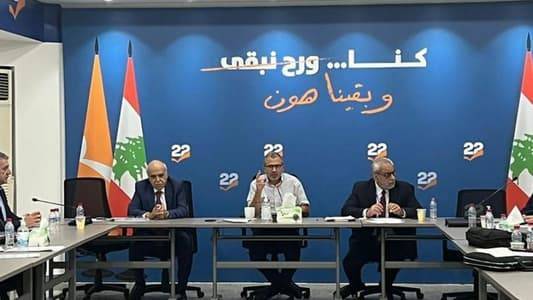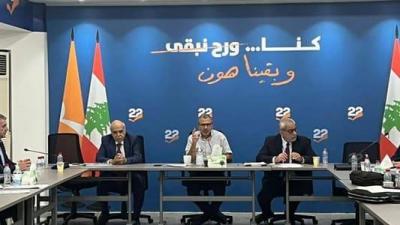It is the same Najib Mikati who previously stood against Hassan Diab, in collaboration with former prime ministers, when the idea of holding a Cabinet session was proposed. At that time, the President, General Michel Aoun, was the one keen on holding a government session for the caretaker government. Mikati is the same person who consistently declared, day and night, that he "won't do it," nearly swearing that he would adhere to the provisions of the constitution during the presidential vacuum, promising "Hezbollah" that he would not call for a Cabinet session except in emergencies and if all avenues were blocked before him, forcing him to summon an extraordinary Cabinet meeting.
It is also the head of the "Free Patriotic Movement," Gebran Bassil, who daily observes the activities of the ministers affiliated with him, as they perpetually enter and exit the Grand Serail, participate in ministerial committee meetings, maintain regular attendance in their ministries, and operate in a manner that does not align with the narrow framework of caretaker responsibilities, accompanying the Prime Minister on his foreign visits (Abdallah Bouhabib and Walid Fayad to Algeria)... as if the country is functioning and business is as usual.
Thus, the scene of the government session, which incites the anger and resentment of the Aounist team, is a reality in itself, no more and no less. The argument revolves around the constitutional aspect of this reality, which presents it as an infringement on the powers of the President and a transgression thereof. Although the justifications provided by the caretaker Prime Minister regarding the necessity of disbursing some allocations to cover healthcare needs may somewhat alleviate the anger of the Christian public, there is another political aspect that is equally important concerning the relationship between the two pillars of the Mar Mikhael Understanding amidst the presidential entitlement, which itself serves as a contentious point between the "Free Patriotic Movement" and "Hezbollah."
In fact, the relationship at the strategic level remains solid. "Hezbollah" will not abandon its Christian ally as long as it represents a significant segment of Christians. And therein lies the essence. However, if what some consider an inevitable trajectory — in the sense of the splintering of the "Free Patriotic Movement" along with the "Strong Lebanon Bloc" into a collection of "blocs" — occurs, then we will have to see how events unfold. Furthermore, Bassil is not inclined to exit this alliance, for an obvious reason: he has burned all bridges that could carry him to an alternative shore. His poor relationships with various political powers make him a captive of this alliance, even if he becomes its weakest link. This compels the relationship to be a mutual interest in preserving it, even if some disagreements arise "along the way."
In this context, some observers believe that the differentiation between the allies is not the first of its kind, nor will it be the last; however, this does not mean that the relationship is prone to significant shocks. Essentially, in naming Mikati as Prime Minister, the two sides were on opposing banks. Now, they are separating in regard to participation in the problematic Cabinet session.
According to these observers, the party is not comfortable with Mikati's decision to call for the session, especially since he had made promises and assurances that he would only do so if the need was urgent. At the same time, the party knows that the caretaker Prime Minister holds everyone by the painful lever, which is the essential needs of the people; hence, he rushed to push them into participation, or else they would face criticism from public opinion.
Nevertheless, it is crucial not to underestimate the significance of the split occurring in the paths of the two allies at this specific time, linked to two factors: First, this is the first battle that the "Free Patriotic Movement" is waging after President Michel Aoun's exit from the Baabda Palace, thus losing Bassil many of the keys to his influence and authority. The second factor is the timing of this battle amidst the presidential vacuum, as Bassil attempts to strengthen his cards against "Hezbollah's" efforts to improve the status of its main candidate, namely the head of the "Marada Movement," Sleiman Frangieh.
According to some observers, the importance of the party's decision to participate, rather than retreat, similar to some Christian ministers who Bassil has managed to sway, contrary to what he has been promoting about them being outside his umbrella, establishes a new trajectory in the bilateral relationship between the "party" and the "movement," which appears to dictate the upcoming phase, fundamentally opposed to the nature of the past phase. Since the inception of the understanding between the two teams, the "party" has treated Bassil with considerable attention, care, and indulgence, while he has exerted all forms of political extortion to achieve his goals and demands, which were always prioritized, even at the expense of crippling the country. It seems that this pattern is subject to radical change.
According to observers, "the party" will not break the understanding nor abandon Bassil, but it may be an attempt to reduce the amount of indulgence previously designated for him. It is likely akin to a "twist" in the relationship that will govern the coming phase, which may force "the party" to leave Bassil isolated if it manages to secure a majority that positions Sleiman Frangieh as President.
They say that the party's refusal to align with the "Free Patriotic Movement" regarding its position on Mikati's controversial session may be an initial indication of how it will act concerning the presidential entitlement if it improves Frangieh's circumstances, even without Bassil's participation. Thus, the backdrop of this decision could represent a form of indirect pressure on two fronts: the first being a matter of buying time through a government patching, as the total vacuum will not grant "the party" enough time to improve its circumstances for Frangieh's battle; the second, pressure on Christian forces to accelerate the presidential wheel under the pretext of refusing to allow a government with restricted powers to inherit the position of the first presidency.




